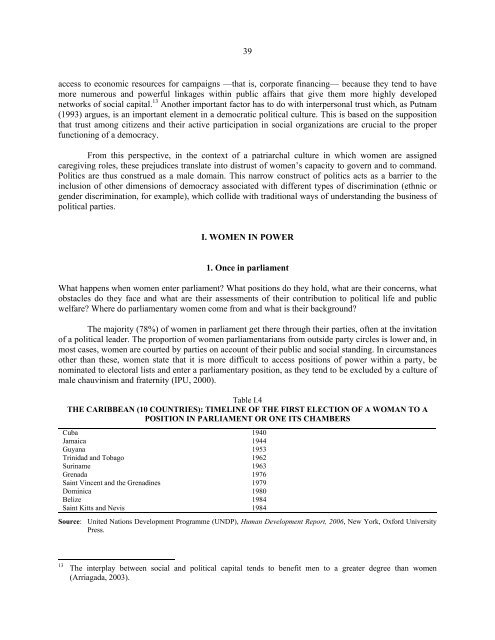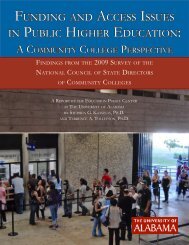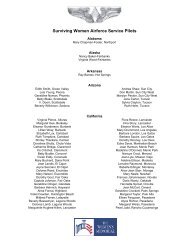Women in Latin America and the Caribbean - Cepal
Women in Latin America and the Caribbean - Cepal
Women in Latin America and the Caribbean - Cepal
You also want an ePaper? Increase the reach of your titles
YUMPU automatically turns print PDFs into web optimized ePapers that Google loves.
39<br />
access to economic resources for campaigns —that is, corporate f<strong>in</strong>anc<strong>in</strong>g— because <strong>the</strong>y tend to have<br />
more numerous <strong>and</strong> powerful l<strong>in</strong>kages with<strong>in</strong> public affairs that give <strong>the</strong>m more highly developed<br />
networks of social capital. 13 Ano<strong>the</strong>r important factor has to do with <strong>in</strong>terpersonal trust which, as Putnam<br />
(1993) argues, is an important element <strong>in</strong> a democratic political culture. This is based on <strong>the</strong> supposition<br />
that trust among citizens <strong>and</strong> <strong>the</strong>ir active participation <strong>in</strong> social organizations are crucial to <strong>the</strong> proper<br />
function<strong>in</strong>g of a democracy.<br />
From this perspective, <strong>in</strong> <strong>the</strong> context of a patriarchal culture <strong>in</strong> which women are assigned<br />
caregiv<strong>in</strong>g roles, <strong>the</strong>se prejudices translate <strong>in</strong>to distrust of women’s capacity to govern <strong>and</strong> to comm<strong>and</strong>.<br />
Politics are thus construed as a male doma<strong>in</strong>. This narrow construct of politics acts as a barrier to <strong>the</strong><br />
<strong>in</strong>clusion of o<strong>the</strong>r dimensions of democracy associated with different types of discrim<strong>in</strong>ation (ethnic or<br />
gender discrim<strong>in</strong>ation, for example), which collide with traditional ways of underst<strong>and</strong><strong>in</strong>g <strong>the</strong> bus<strong>in</strong>ess of<br />
political parties.<br />
I. WOMEN IN POWER<br />
1. Once <strong>in</strong> parliament<br />
What happens when women enter parliament What positions do <strong>the</strong>y hold, what are <strong>the</strong>ir concerns, what<br />
obstacles do <strong>the</strong>y face <strong>and</strong> what are <strong>the</strong>ir assessments of <strong>the</strong>ir contribution to political life <strong>and</strong> public<br />
welfare Where do parliamentary women come from <strong>and</strong> what is <strong>the</strong>ir background<br />
The majority (78%) of women <strong>in</strong> parliament get <strong>the</strong>re through <strong>the</strong>ir parties, often at <strong>the</strong> <strong>in</strong>vitation<br />
of a political leader. The proportion of women parliamentarians from outside party circles is lower <strong>and</strong>, <strong>in</strong><br />
most cases, women are courted by parties on account of <strong>the</strong>ir public <strong>and</strong> social st<strong>and</strong><strong>in</strong>g. In circumstances<br />
o<strong>the</strong>r than <strong>the</strong>se, women state that it is more difficult to access positions of power with<strong>in</strong> a party, be<br />
nom<strong>in</strong>ated to electoral lists <strong>and</strong> enter a parliamentary position, as <strong>the</strong>y tend to be excluded by a culture of<br />
male chauv<strong>in</strong>ism <strong>and</strong> fraternity (IPU, 2000).<br />
Table I.4<br />
THE CARIBBEAN (10 COUNTRIES): TIMELINE OF THE FIRST ELECTION OF A WOMAN TO A<br />
POSITION IN PARLIAMENT OR ONE ITS CHAMBERS<br />
Cuba 1940<br />
Jamaica 1944<br />
Guyana 1953<br />
Tr<strong>in</strong>idad <strong>and</strong> Tobago 1962<br />
Sur<strong>in</strong>ame 1963<br />
Grenada 1976<br />
Sa<strong>in</strong>t V<strong>in</strong>cent <strong>and</strong> <strong>the</strong> Grenad<strong>in</strong>es 1979<br />
Dom<strong>in</strong>ica 1980<br />
Belize 1984<br />
Sa<strong>in</strong>t Kitts <strong>and</strong> Nevis 1984<br />
Source: United Nations Development Programme (UNDP), Human Development Report, 2006, New York, Oxford University<br />
Press.<br />
13<br />
The <strong>in</strong>terplay between social <strong>and</strong> political capital tends to benefit men to a greater degree than women<br />
(Arriagada, 2003).











